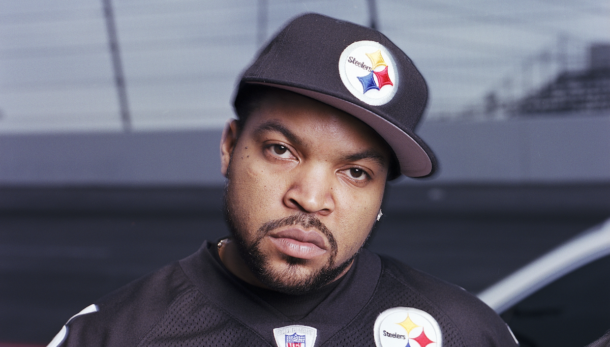Ice Cube Details The Connection Between The Music Industry & Prisons

For over 35 years, Ice Cube has been an independent artist—from Ruthless Records to a lengthy tenure at Priority Records—to running his own Lench Mob imprint. In a new conversation with Bill Maher, Cube explains why he has avoided major labels despite his success.
At 17:00 in The Club Random Podcast, Cube and Bill reconnect with some things to smoke and drink and plenty to discuss. At this point in the interview, the two men discuss language and terminology set to divide communities. Moving the talking point to music, Cube asks, “Who benefits and profits off of our bickering and our division? It’s like, follow the money.” As Bill Maher asks for specifics, Cube locks in on the prison complex, especially privatized prisons. “I don’t know they names, Bill, but if you follow the money and you go high enough, you’ll start to see [things]. Okay, let’s take Rap music. The same people who own the labels own the prisons.”
Ice Cube Asks Bill Maher Why He Thought He Could Use The N-Word (Video)
Bill Maher asks, “Literally the same people?” Cube responds, “Literally, the same people who own the labels own private prisons. So it seems really kinda suspicious—if you wanna say that word—that the records that come out are really geared to push people towards that prison industry.”
[embedded content]
The N.W.A. and Westside Connection alum explains, “It’s not about making somebody write the lyrics; it’s about being there as guardrails to making sure certain songs make it through, and certain songs don’t. Certain flavors are exposed on the record. You know, some records are made by committee—meaning: record company guys sit around and tell the artist, ‘This is hot; say that. Do this; we’re gonna have this guy write the lyrics. We’re gonna have that.’ So the narrative is really kind of structured and made into what the record company wants the record to be. A lot of artists are frustrated with this kind of music-making. A lot of people are feeling like they’re being controlled by the label. This is how they do it: telling you what songs to sing, what hooks to do…’ You can do your song; that’s fine. That’s an album cut. But the single is what we all say is the single.’ So you have the record company pushing the narrative. This, to me, is some social engineering going on here, to make sure those prisons stay full.”
JAY-Z & Yo Gotti Are Demanding Prison Reform. A New Video Shows Why
Cube also zooms out to the topic that prompted his point. “Now, of course, there’s a lot of dots to connect to make that happen. But I’m just giving you a broad example of how people at the top can manipulate what’s going on with the people who are bickering and fighting.”
Roughly one week ago, Busta Rhymes echoed this sentiment while receiving the Lifetime Achievement Award at the 2023 BET Awards. “One thing I need y’all to know: we gonna stop these little petty beefs that we be doin’ in Rap,” Busta said amid an extended speech. “Y’all messin’ up the bag. Y’all messin’ up the energy. I don’t like when I talk these dudes that run these streaming platforms and they talkin’ about, ‘we’re turning the consumer off because there’s so much little this and little that goin’ on with you rappers.’ We’re gonna stop that. We’re gonna love each other, and we’re gonna get to this money. Executives, start promoting everything that can be great in the music, too. It ain’t just gotta be about the ass-shakin’ and how much drugs we sold, and how much dudes we tied up, and how much drugs we doin’.” Notably, Busta also announced that he had reunited with an important executive from his career, Sylvia Rhone. Following their 1990s Elektra Records tenure, they will work together at Epic. Busta also announced that he was from the era of Chuck D and Big Daddy Kane, two artists who are contemporaries of Ice Cube.
Sha Stimuli Asks Why A Prison Stint Is More Valued Than A College Degree In Hip-Hop (Video)
In the new Ice Cube prison conversation, Bill Maher agrees that the industrial prison complex is a horrid facet of society. He also asks Cube to clarify if the executive teams at prominent labels are also personally working in prisons. “Of course, they’re not actually running the labels; they have financial interests.”
Cube explains that given these dangerous interests, he has insisted on remaining independent throughout his career. Maher asks if the N.W.A. release “F__k Tha Police” would qualify as a song that could lead to an arrest, not unlike contemporary songs about opps or lean. In his case, Cube maintains, “That’s pure artistry.” The MC adds that he created that iconic song himself, without label influence.
Ice Cube Shows 3 Decades Of Police Brutality & It’s Not Just White Cops (Video)
Cube then adds, “I wouldn’t let an A&R a__hole in my studio. ‘You’re not f__kin’ comin’ here and tellin’ me how to make a record.” He remarks, “I never let anybody A&R me but Dr. Dre.”
In a clip circulated online, Bone Thugs-n-Harmony’s Krayzie Bone personally read a 2012 article, The Secret Meeting that Changed Rap Music and Destroyed a Generation, which published at HipHopIsRead, written by a “John Smith,” self-proclaimed “decision maker” in the music industry.
Yasiin Bey Discusses The Drama That’s Caused Him To Fall Back From The Music Business (Video)
“In early 1991, I was invited to attend a closed-door meeting with a small group of music business insiders to discuss Rap music’s new direction. Little did I know that we would be asked to participate in one of the most unethical and destructive business practices I’ve ever seen,” wrote the author. A few paragraphs later, the account of the Los Angeles, California event read, “The speaker went on to tell us that the respective companies we represented had invested in a very profitable industry which could become even more rewarding with our active involvement. He explained that the companies we work for had invested millions into the building of privately owned prisons and that our positions of influence in the music industry would actually impact the profitability of these investments. I remember many of us in the group immediately looking at each other in confusion. At the time, I didn’t know what a private prison was but I wasn’t the only one. Sure enough, someone asked what these prisons were and what any of this had to do with us. We were told that these prisons were built by privately-owned companies that received funding from the government based on the number of inmates. The more inmates, the more money the government would pay these prisons. It was also made clear to us that since these prisons are privately owned, as they become publicly traded, we’d be able to buy shares.”
I would like for @iamKrayzieBone to join us on #LibertySpaces to discuss what happened with hip-hop in 1991 and the shift… pic.twitter.com/2WCyjwkXnJ
— Doni 🤓🏴🏴☠️ (@DoniTheDon_) June 19, 2023
Two sentences later, the author writes. “At this point, my industry colleague who had first opened the meeting took the floor again and answered our questions. He told us that since our employers had become silent investors in this prison business, it was now in their interest to make sure that these prisons remained filled. Our job would be to help make this happen by marketing music that promotes criminal behavior, rap being the music of choice. He assured us that this would be a great situation for us because Rap music was becoming an increasingly profitable market for our companies, and as employees, we’d also be able to buy personal stocks in these prisons. Immediately, silence came over the room. You could have heard a pin drop.”
Rappers Might Start Going To Jail Because Of Their Lyrics
The account says that several attendees reacted strongly, in verbal and physical protest—prompting weapons being drawn by the presenting group and the protestors being escorted from the meeting. Several paragraphs later, the article says, “Rap acts that talked about politics or harmless fun were quickly fading away as Gangster Rap started dominating the airwaves. Only a few months had passed since the meeting but I suspect that the ideas presented that day had been successfully implemented. It was as if the order has been given to all major label executives. The music was climbing the charts and most companies when more than happy to capitalize on it. Each one was churning out their very own gangster rap acts on an assembly line. Everyone bought into it, consumers included. Violence and drug use became a central theme in most rap music. I spoke to a few of my peers in the industry to get their opinions on the new trend but was told repeatedly that it was all about supply and demand. Sadly many of them even expressed that the music reinforced their prejudice of minorities.” The author claims they left the industry in 1993. In the footage, Krayzie says he agrees with some of the points the author made. He says he felt angry, “Because it’s not enough for them to exploit our culture and make all the money off of it—because, let’s keep it real—the industry has never been favorable towards the artist, ever—but they’re gonna go beyond the artist to influence and lure in the consumer, which they knew at the time, were mainly minorities. In other words: keep promoting Gangsta Rap so that the youngsters would be influenced by them, which in turn, would incite them to want to act like them, and it’s a very good chance that they’ll end up in their prison. So they’re getting paid twice. They’re getting paid from the artist they’re signing, and then they’re getting paid from the people that these artists are influencing that are going to prison from trying to be like these artists.”
The article was covered by NPR show Louder Than A Riot in 2020, with artists including Killer Mike, Angie Martinez, Homeboy Sandman, G Perico, and the recently-convicted Casanova weighing in.
The Outlawz Dispute Jimmy Iovine’s Claim That He Bailed Tupac Out Of Jail (Video)
#BonusBeat: New music from Ice Cube—some Mount Westmore work alongside Snoop Dogg, E-40, and Too Short—is currently on the Ambrosia For Heads playlist:
Powered by WPeMatico
Go to Source
Author: Bandini


